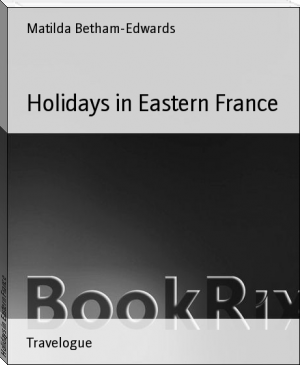East of Paris - Matilda Betham-Edwards (english readers .TXT) 📗

- Author: Matilda Betham-Edwards
Book online «East of Paris - Matilda Betham-Edwards (english readers .TXT) 📗». Author Matilda Betham-Edwards
I must now describe a spot, the name of which will probably be new to all excepting close students of Balzac. The great novelist loved the valley of the Loing almost as fondly as his native Touraine; and if these pastoral scenes did not inspire a _chef d'oeuvre_, they have thereby immensely gained in interest. "Ursule Mirouet," of which I shall have more to say further on, is not to be compared to such masterpieces as "Eugenie Grandet." But a leading incident of "Ursule Mirouet" occurs at Bourron--a sufficient reason for recalling the story here.
The beauty of our village, like the beauty of French women, to quote Michelet, "is made up of little nothings." There are a hundred and one pretty things to see but very few to describe. Who could wish it otherwise? Little nothings of an engaging kind better agree with us as daily fare than the seven wonders of the world. With forty thousand acres of forest at our doors we do not want M. Mattel's newly discovered underground river within reach as well.
From our garden we yet look upon scenes not of every day. Those sweeps of bluish-green foliage strikingly contrasted with the brilliant vine remind us that we are in France, and in a region with most others having its specialities. Asparagus, not literally but figuratively, nourishes the entire population of Bourron. Everyone here is a market gardener on his own account, and the cultivation of asparagus for the Paris markets is a leading feature of local commerce.
There is no more graceful foliage than that of this plant, and gratefully the eye rests upon these waves of delicate green under a blazing, grape-ripening sky. Making gold-green lines between are vines, a succession of asparagus beds and vineyards separating our village from its better known and more populous neighbour, Marlotte. In the opposite direction we see brown-roofed, white-walled houses surmounted by a pretty little spire. This is Bourron. To reach it we pass a double row of homesteads, rustic interiors of small farmer or market gardener, the one, as our French neighbours say, more picturesque than the other. Each, no matter how ill kept, is set off by an ornamental border, zinnias, begonias, roses and petunias as obviously showing signs of care and science. Oddly enough the finest display of flowers often adorns the least tidy premises. And oddly enough, rather perhaps as we should expect it, in not one, but in every respect, this French village is the exact opposite of its English counterpart. In England every tenant of a cottage pays rent, there, not an inhabitant, however poor, but sits under his own vine and his own fig-tree. In England the farm-house faces the road and the premises lie behind. Here manure-heap, granary and pig styes open on the highway, the dwellings being at the back. In England a man's home, called his castle, is no more defended than the Bedouin's tent. Here at nightfall the small peasant proprietor is as securely entrenched within walls as a feudal baron in his moated chateau. In England ninety-nine householders out of a hundred are perpetually changing their domicile. Here folks live and die under the paternal roof that has sheltered generations. Nor does diversity end with circumstances and surroundings. As will be seen in another chapter, habits of life, modes of thought and standards of duty show contrasts equally marked.
Bourron possesses twelve hundred and odd souls, most of whom are peasants who make a living out of their small patrimony. Destined perhaps one day to rival its neighbour Marlotte in popularity--even to become a second Barbizon--it is as yet the sleepiest, most rustic retreat imaginable. The climate would appear to be not only anti-asthmatic but anti-everything in the shape of malady. Anyhow, if folks fall ill they have to send elsewhere for a doctor. Minor complaints--cuts, bruises and snake bites--are attended to by a Fontainebleau chemist. Every day we hear the horn of his messenger who cycles through the village calling for prescriptions and leaving drugs and draughts.
A post office, of course, Bourron possesses, but let no one imagine that a post office in out of the way country places implies a supply of postage stamps. English people are the greatest scribblers by post in the world, whilst our wiser French neighbours appear to be the laziest. An amusing dilemma had occurred here just before my arrival. One day my friends applied to the post office for stamps, but none were to be had for love or money. Off somebody cycled to Marlotte, which possesses not only a post and telegraph, but a money order office as well--same reply, next the adjoining village of Grez was visited and with no better result--"Supplies have not yet reached us from headquarters," said the third postmistress.
Perhaps instead of smiling contemptuously we should take a moral to heart. The amount of time, money, eyesight and handcraft expended among ourselves on letter writing so-called is simply appalling. Was it not Napoleon who said that all letters if left unanswered for a month answered themselves? Too many Englishwomen spend the greater portion of the day in what is no longer a delicate art, but mere time-killing, after the manner of patience, games of cards and similar pastimes.
Bourron is a most orderly village; within its precincts liberty is not allowed to degenerate into licence. As in summer-time folks are fond of spending their evenings abroad, a municipal law has enforced quiet after ten o'clock. Thus precisely on the stroke of ten, alike cafe, garden, private summer-house or doorstep are deserted, everyone betakes himself indoors, leaving his neighbours to enjoy unbroken repose. A most salutary by-law! Would it were put in force throughout the length and breadth of France! At Chatouroux I have been kept awake all night by the gossip of a _sergeant de ville_ and a lounger close to my window. At Tours, La Chatre and Bourges my fellow-traveller and myself could get no sleep on account of street revellers, whilst at how many other places have not holiday trips been spoiled by unquiet nights? All honour then to the aediles of dear little Bourron!
CHAPTER IV.
BOURRON--
(continued).
Forty thousand acres of woodland at one's doors would seem a fact sufficiently suggestive; to particularize the attractions of Bourron after this statement were surely supererogation. Yet, for my own pleasure as much as for the use of my readers, I must jot down one or two especially persistent memories, impressions of solemnity, beauty and repose never to be effaced.
Of course it is only the cyclist who can realise such an immensity as the Fontainebleau forest. From end to end these vast sweeps are now intersected by splendid roads and by-roads. Old-fashioned folks, for whom the horseless vehicle came too late, can but envy wheelmen and wheelwomen as they skim through vista after vista, outstripping one's horse and carriage as a greyhound outstrips a decrepit poodle. On the other hand only inveterate loiterers, the Lazy Lawrences of travel, can appreciate the subtler beauties of this woodland world. There are certain sights and sounds not to be caught by hurried observers, evanescent aspects of cloud-land and tree-land, rock and undergrowth, passing notes of bird and insect, varied melodies, if we may so express it, of summer breeze and autumn wind--in fine, a dozen experiences enjoyed one day, not repeated on the next. The music of the forest is a quiet music and has to be listened for, hardly on the cyclist's ear falls the song or rather accompaniment of the grasshopper, "the Muse of the wayside," a French poet has so exquisitely apostrophized.
One's forest companion should be of a taciturn and contemplative turn. Only thus can we drink in the sense of such solitude and immensity; realizing to the full what indeed these words may mean, he may wander for hours without encountering a soul, very few birds are heard by the way, but the hum of the insect world, that dreamy go-between, hardly silence, hardly to be called noise, keeps us perpetual company, and our eyes must ever be open for beautiful little living things. Now a green and gold lizard flashes across a bit of grey rock, now a dragon-fly disports its sapphire wings amid the yellowing ferns or purple ling, butterflies, white, blue, and black and orange, flit hither and thither, whilst little beetles, blue as enamel beads, enliven the mossy undergrowth.
One pre-eminent charm indeed of the Fontainebleau forest is this wealth of undergrowth, bushes, brambles and ferns making a second lesser thicket on all sides. In sociable moods delightful it is to go a-blackberrying here. I am almost tempted to say that if you want to realise the lusciousness of a hedgerow dessert you must cater for yourself in these forty thousand acres of blackberry orchard.
But the foremost, the crowning excellence of Fontainebleau forest consists in its variety. France itself, the "splendid hexagon," with its mountains, rivers and plains, is hardly more varied than this vast area of rock and woodland. We can choose between sites, savage or idyllic, pastoral or grandiose, here finding a sunny glade, the very spot for a picnic, there break-neck declivities and gloomy chasms. The magnificent ruggedness of Alpine scenery is before our eyes, without the awfulness of snow-clad peaks or the blinding dazzle of glacier. In more than one place we could almost fancy that some mountain has been upheaved and split asunder, the clefts formed by these gigantic fragments being now filled with veteran trees.
The formation of the forest has puzzled geologists, to this day the origin of its rocky substratum remaining undetermined.
Within half an hour's stroll of Bourron lies the so-called "Mare aux Fees" or Fairies' Mere, as sweet a spot to boil one's kettle in as holiday makers can desire, at the same time affording the best possible illustration of what I have just insisted upon. For this favourite resort is in a certain sense microcosmic, giving in miniature those characteristics for which the forest is remarkable. Smooth and sunny as a garden plot is the open glade wherein we now halt for tea, and while the kettle boils we have time for a most suggestive bird's eye view. It is a little world that we survey from the borders of this rock-hemmed, forest-girt lake, one perspective after another with varying gradations of colour making us realize the many-featured, chequered area spread before us. From this coign of vantage are discerned alike the sterner and the more smiling beauties of the forest, rocky defiles, gloomy passes, sunlit lawns and mossy dells, scenery varied in itself and yet varying again with the passing hour and changing month. And such suggestion of almost infinite variety is not gained only from the Fairies' Mere. From a dozen points, not the same view but the same kind of view may be obtained, each differing from the other, except in charm and immensity. Within a walk of home also stands one of the numerous monuments scattered throughout the forest. The Croix de Saint Herem, now a useful landmark for cyclists, has a curious history. It was erected in 1666 by a certain Marquis de Saint-Herem, celebrated for his ugliness, and centuries later was the scene of the most extraordinary rendezvous on record. Here, in 1804, every detail having been theatrically arranged beforehand, took place the so-called chance meeting of Napoleon and Pope Pius VII. The Emperor had arranged a grand hunt for that day,





Comments (0)